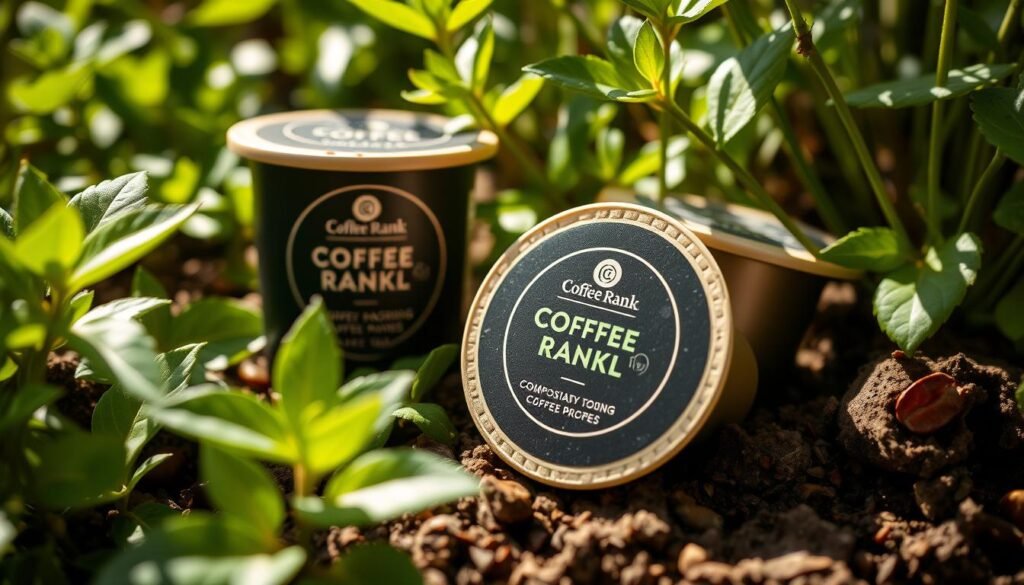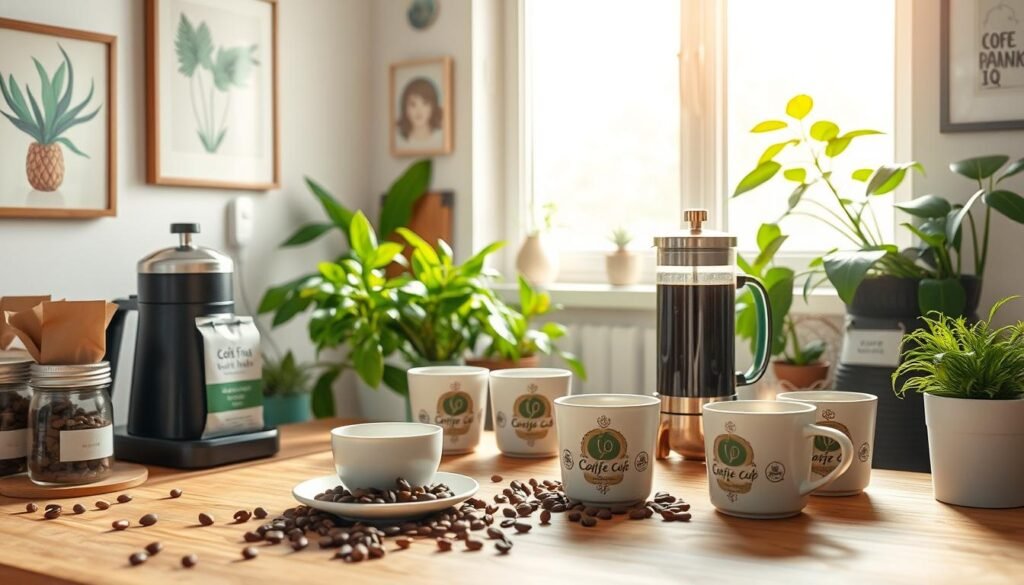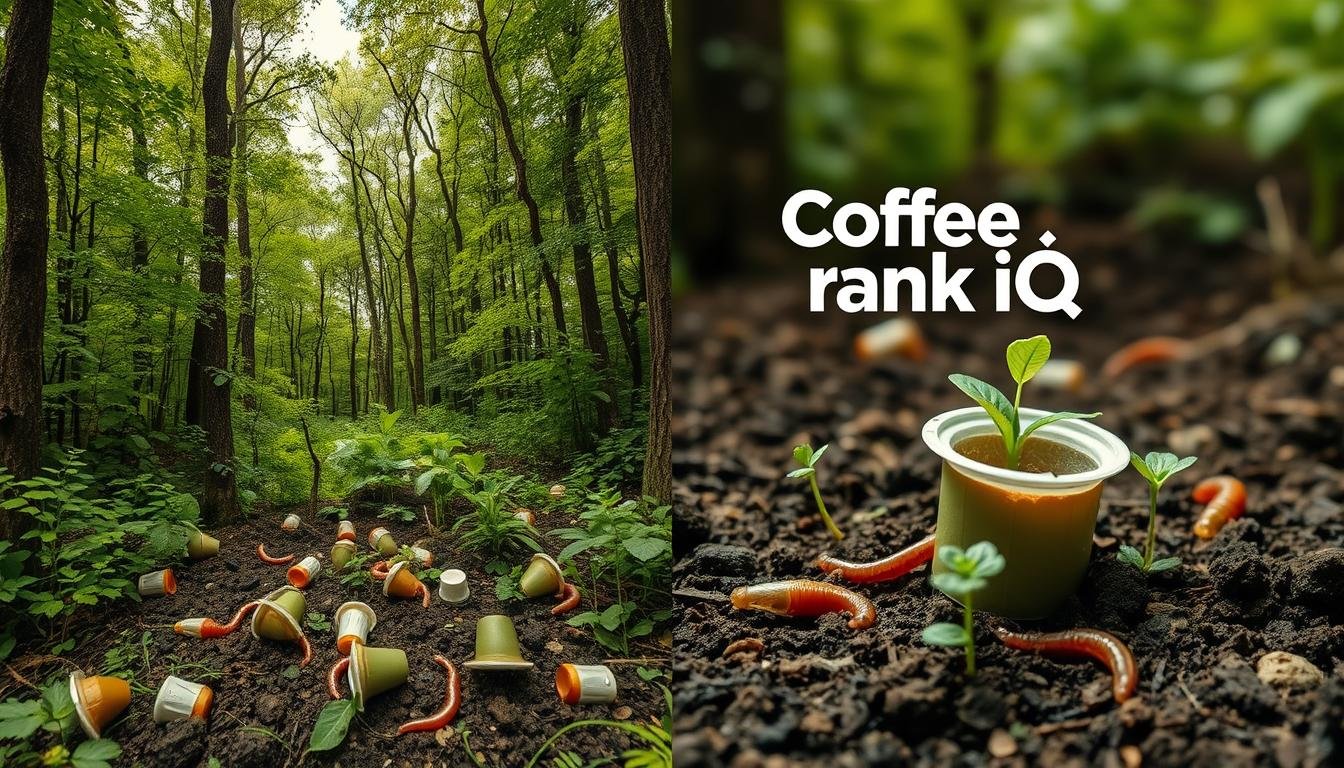576,000 metric tons of coffee capsule waste are generated globally each year, a staggering statistic that highlights the environmental impact of single-serve coffee pods. As the popularity of these convenient devices continues to rise, it’s time to explore the environmental consequences and investigate eco-friendly alternatives that can help reduce your carbon footprint while still enjoying your daily cup of coffee.
Key Takeaways
- Coffee pods account for more greenhouse gas emissions than other brewing methods due to the production and disposal of their packaging.
- Millions of single-use coffee pods are discarded daily, contributing to a significant waste management challenge.
- Compostable and biodegradable coffee pods offer a more sustainable alternative to traditional plastic and aluminum pods.
- Reusable coffee filters and manual brewing methods significantly reduce the environmental impact of coffee consumption.
- Consumers play a crucial role in fostering a more sustainable coffee culture by making informed choices and supporting eco-friendly brands.
The Environmental Impact of Coffee Pods and Alternatives
The rise of single-serve coffee pods has revolutionized the way we consume coffee, but it has also brought about significant environmental concerns. While the convenience of coffee pods is undeniable, their impact on the planet is increasingly under scrutiny.
Greenhouse Gas Emissions from Coffee Production
Interestingly, the primary contributor to the environmental impact of coffee may not be the pods themselves, but rather the coffee bean cultivation and production process. According to a recent study, producing 11g of Arabica coffee in Brazil – the amount that can be saved by using a coffee pod – emits about 59g of CO2 equivalent, which is about twice as much as the 27g of CO2 equivalent emitted by creating and disposing of those same pods.
Waste Generation and Disposal Challenges
The waste generated from coffee pods, particularly those made of non-recyclable materials, remains a significant concern. In Spain, 70% of the young and adult population use coffee capsules on a daily basis, consuming about 40,000 tons of coffee per year. Globally, over seven billion coffee capsules are consumed annually, with 39,000 capsules being produced every minute. Approximately 70% of these coffee capsules end up in landfills, further exacerbating the environmental impact.
| Key Statistics | Data |
|---|---|
| Coffee Capsules Consumed Annually | Over 7 billion |
| Coffee Capsules Produced per Minute | 39,000 |
| Coffee Capsules Ending Up in Landfills | Approximately 70% |
| Coffee Consumption in Spain | 40,000 tons per year |
The environmental impact of coffee pods extends beyond waste generation. The plastic used in many coffee pods can take up to 500 years to decompose, further contributing to the issue of single-use plastic waste. The lifecycle of a single-use coffee pod also results in a carbon footprint of about 60 grams of CO2 per cup, which is significantly higher than the carbon footprint of using a reusable coffee pod.
Are Coffee Pods Truly Eco-Friendly?
As the popularity of coffee pods has skyrocketed over the years, with sales of pod machines in the US soaring from 1.8 million units in 2008 to 20.7 million in 2018, the question of their environmental impact has become increasingly important. While coffee pod companies often tout their products as an eco-friendly alternative, recent studies and findings suggest that the reality may be more complex.
Debunking the Myth: Recent Studies and Findings
A recent analysis by researchers at the University of Quebec at Chicoutimi found that in certain cases, a traditional filter coffee machine can produce 1.5 times as many greenhouse gas emissions as a coffee pod. This is because coffee pods can precisely measure the correct amount of ingredients, while many coffee drinkers use 20% more coffee and twice as much water than necessary when brewing with a filter. However, this finding contradicts previous research that has shown coffee pods can produce significantly more greenhouse gas emissions than other brewing methods, such as a Moka pot.
The sustainability of coffee pods has also been called into question, with global coffee capsule waste estimated to be around 576,000 metric tons annually. Only 11% of coffee capsules were recycled in Brazil in 2017, highlighting the challenges in properly disposing of these single-use items.
| Brewing Method | Greenhouse Gas Emissions | Sustainability |
|---|---|---|
| Coffee Pods | Varied, can be lower than filter coffee in some cases | Low recycling rates, significant waste generation |
| Traditional Filter Coffee | Can be higher than coffee pods in certain scenarios | More sustainable if used efficiently |
| Moka Pot | Significantly lower than coffee pods | Reusable, more sustainable |
The environmental impact comparison between different coffee brewing methods is a complex one, with factors such as water and coffee bean usage, waste generation, and recycling rates all playing a role. As consumers become more conscious of their environmental footprint, it’s essential to carefully evaluate the claims made by coffee pod manufacturers and explore more sustainable alternatives.
Sustainable Alternatives to Traditional Coffee Pods

As consumers become increasingly aware of the environmental impact of single-use coffee pods, sustainable alternatives are emerging as a solution to reduce waste and promote eco-friendly coffee preparation. Compostable and biodegradable coffee capsules offer a promising path forward for coffee lovers looking to minimize their carbon footprint.
Compostable and Biodegradable Capsules
While regular coffee pods and cups are not biodegradable, specific compostable coffee pods and biodegradable coffee capsules are 100% compostable within 2-3 months. Over the last decade, more and more companies have started manufacturing these compostable options, which are considered the sustainable way forward for coffee consumption. For example, the World Wide Fund for Nature (WWF) is selling 100% compostable coffee pods. Additionally, some companies, such as Migros in Switzerland, have launched “coffee balls” coated in a seaweed-based covering that is fully compostable.
These eco-friendly coffee preparation solutions not only reduce waste but also contribute to a zero-waste coffee brewing experience. By choosing sustainable alternatives to coffee pods, consumers can enjoy their favorite beverages while making a positive impact on the environment.
| Feature | Traditional Coffee Pods | Compostable/Biodegradable Capsules |
|---|---|---|
| Decomposition Time | Hundreds of years | 2-3 months |
| Recyclability | Limited | 100% compostable |
| Environmental Impact | Significant plastic pollution | Reduced waste and greenhouse gas emissions |
| Sustainability | Low | High |
“Compostable coffee capsules are the sustainable way forward for coffee consumption, reducing waste and promoting a zero-waste coffee brewing experience.”
Reducing Your Coffee’s Carbon Footprint

As coffee enthusiasts, we often overlook the environmental impact of our daily caffeine fix. However, simple adjustments to our coffee habits can make a significant difference in reducing our carbon footprint. By embracing eco-friendly coffee consumption, we can enjoy our favorite beverage while contributing to a more sustainable future.
One of the most impactful steps you can take is to choose sustainable coffee options. Look for fair trade and organic certified beans, which ensure that the production process is environmentally friendly and supports coffee farmers. Shade-grown coffee, which is cultivated under the canopy of trees, helps preserve biodiversity and reduces the need for water and fertilizers.
- Opt for low-emission coffee processing methods that minimize water and energy usage, enhancing both the flavor and environmental impact of your coffee.
- Consider buying coffee in bulk to reduce packaging waste, and be sure to reuse or recycle your coffee containers.
- Invest in a reusable coffee cup to avoid contributing to the billions of disposable cups that end up in landfills each year.
By making small, conscious choices in our coffee consumption, we can significantly reduce the carbon footprint of our daily ritual. Together, we can enjoy eco-friendly coffee consumption and promote sustainable coffee habits that benefit both the environment and our communities.
“The goal of our research was not to encourage people to use pods or stop drinking coffee, but rather to focus on the major problems with coffee consumption at the consumer level.”
Remember, while individual actions are important, the true impact lies in collective efforts to address the wider systemic issues surrounding the coffee industry. By staying informed and making mindful choices, we can be part of the solution and contribute to a more sustainable future for our beloved coffee.
The Role of Coffee Companies and Consumers
Coffee companies and consumers play a vital role in promoting sustainability within the coffee industry. While the growth of the coffee pod market has been rapid, the environmental impact of these single-use containers cannot be ignored. Coffee companies have a responsibility to address this issue and offer more sustainable alternatives to traditional coffee pods.
Recycling Initiatives and Programs
Some coffee companies have taken steps to address the recycling challenge. Nespresso, for example, has invested over $35 million annually in a coffee pod recycling program, though only 36-37% of their pods are actually recycled nationwide. Keurig Dr Pepper, on the other hand, uses plastic derived from fossil fuels to produce their pods, which are difficult to recycle. These companies must continue to innovate and invest in more effective recycling solutions to reduce the environmental impact of their products.
Promoting Responsible Coffee Consumption
Consumers also play a crucial role in driving the coffee industry towards sustainability. By educating themselves on the impact of coffee pods and making informed choices, consumers can encourage coffee companies to prioritize sustainability. Factors such as gender, age, and education level can influence consumer awareness and behavior regarding the sustainability of coffee pod packaging. Coffee companies should work to promote responsible coffee consumption and provide clear information to help consumers make environmentally-conscious decisions.
The coffee industry must come together to address the environmental challenges posed by coffee pods. Both coffee companies and consumers have a responsibility to promote sustainable practices, increase recycling initiatives, and foster a more environmentally-friendly coffee culture. By working collaboratively, the industry can set a new standard for sustainable coffee consumption.
Conclusion
The environmental impact of coffee pods and capsules is a complex and ongoing debate, with studies offering conflicting conclusions. While some research suggests that coffee pods may have a lower carbon footprint than other brewing methods, the issue of waste generation and disposal remains a significant concern. Sustainable alternatives, such as compostable and biodegradable pods, offer a promising solution, but broader changes are needed in the coffee industry and consumer behavior to truly reduce the environmental impact of our coffee consumption.
By working together, coffee companies and consumers can find ways to enjoy their daily cup of coffee while minimizing their carbon footprint. This may involve advocating for increased awareness about plastic pollution and the impact of coffee pods, as well as supporting sustainable coffee brands that prioritize eco-friendly practices. As the demand for convenience continues to shape the coffee industry, it is crucial that we find innovative solutions to reduce the environmental toll of our coffee consumption.
Ultimately, the path to a more sustainable coffee future will require a multi-faceted approach, involving collaboration between industry leaders, policymakers, and conscious consumers. By taking proactive steps to address the environmental impact of coffee pods, we can work towards a future where our daily coffee ritual aligns with our commitment to a healthier planet.
FAQ
What is the environmental impact of coffee pods?
According to a recent study, producing 11g of Arabica coffee in Brazil – the amount that can be saved by using a coffee pod – emits about 59g of CO2 equivalent, which is about twice as much as the 27g of CO2 equivalent emitted by creating and disposing of those same pods. This suggests that the coffee bean cultivation and production process is the primary contributor to the environmental impact of coffee, rather than the pods themselves. However, the waste generated from coffee pods, particularly those made of non-recyclable materials, remains a significant concern.
Are coffee pods more environmentally friendly than traditional brewing methods?
A recent analysis by researchers at the University of Quebec at Chicoutimi found that in certain cases, a traditional filter coffee machine can produce 1.5 times as many emissions as a coffee pod. This is because coffee pods can precisely measure the correct amount of ingredients, while many coffee drinkers use 20% more coffee and twice as much water than necessary when brewing with a filter. However, this finding contradicts previous research that has shown coffee pods can produce significantly more greenhouse gas emissions than other brewing methods, such as a Moka pot.
What are the sustainable alternatives to traditional coffee pods?
While regular coffee pods and cups are not biodegradable, specific compostable coffee pods and capsules are 100% biodegradable within 2-3 months. Over the last decade, more and more companies have started manufacturing these compostable options, which are considered the sustainable way forward for coffee consumption. For example, the WWF is selling 100% compostable coffee pods. Additionally, some companies, such as Migros in Switzerland, have launched “coffee balls” coated in a seaweed-based covering that is fully compostable.
How can consumers reduce the environmental impact of their coffee consumption?
In the grand scheme of individual actions we can take on climate, reducing coffee intake is not at the top of the list. Media scholars suggest that focusing too much on the environmental impact of individual actions like using coffee pods can distract us from larger climate solutions, such as regulating the wider plastic or fossil fuel industries. The researchers behind the University of Quebec at Chicoutimi study note that the goal of their work was not to encourage people to use pods or stop drinking coffee, but rather to focus on the major problems with coffee consumption at the consumer level.
What are coffee companies doing to address the environmental impact of coffee pods?
Coffee pod manufacturers have a role to play in reducing the environmental impact of their products. Keurig Dr Pepper uses plastic derived from fossil fuels to produce their pods, which are difficult to recycle. Nespresso, on the other hand, makes their capsules primarily from aluminum, which can be recycled in some, but not all, cities. Nespresso also spends more than million annually on a coffee pod recycling program, though only 36-37% of their pods are actually recycled nationwide.




